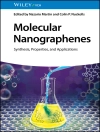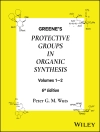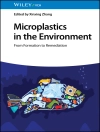Science of Synthesis: Houben-Weyl Methods of Molecular Transformations is the entirely new edition of the acclaimed reference series Houben-Weyl, the standard synthetic chemistry resource since 1909. This new edition is published in English and will comprise 48 volumes published between the years 2000 and 2008.
Science of Synthesis is a quality reference work developed by a highly esteemed editorial board to provide a comprehensive and critical selection of reliable organic and organometallic synthetic methods. This unique resource is designed to be the first point of reference when searching for a synthesis strategy.
- Contains the expertise of presently 400 leading chemists worldwide
- Critically evaluates the preparative applicability and significance of the synthetic methods
- Discusses relevant background information and provides detailed experimental procedures
For full information on the Science of Synthesis series, visit the Science of Synthesis Homepage
Daftar Isi
31.1 Product Class 1: Fluoroarenes
31.2 Product Class 2: Chloroarenes
31.3 Product Class 3: Bromoarenes
31.4 Product Class 4: Aryl Iodine Compounds
31.4.1 Product Subclass 1: Hypervalent Iodoarenes and Aryliodonium Salts
31.4.2 Product Subclass 2: Iodoarenes
31.5 Product Class 5: Phenols and Phenolates
31.5.1 Product Subclass 1: Monohydric Phenols and Corresponding Phenolates
31.5.1.1 Synthesis by Substitution
31.5.1.2 Synthesis by Elimination
31.5.1.3 Synthesis by Rearrangement
31.5.1.4 Synthesis with Retention of the Functional Group
31.5.1.5 Synthesis from Nonaromatic Precursors
31.5.2 Product Subclass 2: Polyhydric Phenols and Corresponding Phenolates
31.5.2.1 Synthesis by Substitution
31.5.2.2 Synthesis by Elimination
31.5.2.3 Synthesis by Addition
31.5.2.4 Synthesis by Rearrangement
31.5.2.5 Synthesis with Retention of the Functional Group
31.6 Product Class 6: Aryl Ethers
31.6.1 Product Subclass 1: Diaryl Ethers
31.6.2 Product Subclass 2: Alkyl Aryl Ethers
31.6.2.1 Synthesis by Substitution
31.6.2.2 Synthesis by Elimination
31.6.2.3 Synthesis by Rearrangement
31.6.2.4 Synthesis with Retention of the Functional Group
31.6.2.5 Synthesis from Nonaromatic Precursors
31.7 Product Class 7: Aryl Hypohalites, Aryl Peroxides, and Aryloxy Sulfur Compounds
31.8 Product Class 8: Cyclic Aryl Ethers
31.9 Product Class 9: Arenesulfonic Acids and Derivatives
31.9.1 Product Subclass 1: Arenesulfonic Acids and Arenesulfonate Salts
31.9.2 Product Subclass 2: Arenesulfonic Acid Derivatives
31.10 Product Class 10: Aryl Sulfones and Nitrogen Derivatives
31.11 Product Class 11: Arenesulfinic Acids and Derivatives
31.12 Product Class 12: Aryl Sulfoxides and S-Arylsulfimides
31.13 Product Class 13: Arenethiols and Arenethiolates
31.14 Product Class 14: Aryl Sulfides
31.15 Product Class 15: Arylsulfonium Salts and Derivatives
31.16 Product Class 16: Arenesulfenic Acids and Derivatives
31.17 Product Class 17: Aryl Polysulfides
31.18 Product Class 18: Cyclic Aryl Sulfides
31.19 Product Class 19: Aryl Selenium Compounds
31.20 Product Class 20: Aryl Tellurium Compounds
Tentang Penulis
Christopher A. Ramsden












